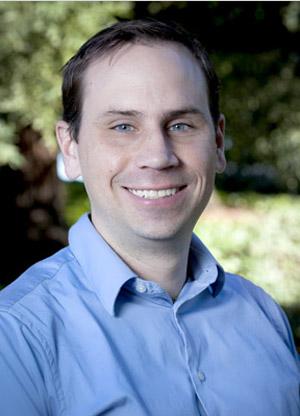It’s hard to imagine that society would abandon its use of carbon-based energy sources. So the question now is whether society can find a way to derive the benefits of hydrocarbons without exhausting supply. One answer may lie in producing carbon-based fuels from renewable sources.
“With renewable carbon-based fuels, your only choice is biomass,” said Andrew Peterson, who will join the School of Engineering this January as an assistant professor. “It’s great, but it’s limited. We need other options.”
Peterson’s primary research is devoted to figuring out how other renewable energies — sun, wind, maybe nuclear — can be harnessed to deliver the kick that hydrocarbons so easily provide. Scientists have investigated consummating the conversion by using a twin-electrode system that ultimately splits carbon dioxide molecules into hydrocarbons. The trick, however, is overcoming the steep energy threshold needed to pull off the reaction. “That’s the challenge. You need an electrocatalyst,” Peterson said.
Peterson’s approach is to bring advanced math to the problem. “I use quantum mechanics calculations to understand the reactions at those electrodes and then use that theory to design catalysts to make those reactions go better,” he said.
“At the end of the day, it’s about converting chemicals,” he continued, “and the way to do that is by a catalyst. That field has just hit the point in the last few years to design these catalysts from first principles, from quantum mechanics.”
There was no epiphany for the 35-year-old to enter chemical engineering. His father was a superintendent in the Dilworth, Minn., school district where Peterson grew up. His mother taught special-education and math classes in a nearby school district. He considered himself a “science nerd” — not a dynamite story.
After graduating from the University of Minnesota, majoring in chemical engineering, Peterson earned his master and doctorate degrees from the Massachusetts Institute of Technology. As a graduate student, he banded together with a few classmates to form a company, C3 Bioenergy. Working nights and weekends, the young scientists demonstrated that the same feedstock used for ethanol could be transformed into propane through fermentation and treatment by water under high pressure and temperature. The idea got media attention and caught the eyes of investors. The group placed second in MIT’s $100K Business Plan Competition in 2007.
Despite the interest and attention, Peterson decided it wasn’t worth the risk. “It got to the point where we had to choose whether to leave graduate school and leave that path. It was a good choice (not to), I think.”
Even though he decided not to develop his company, Peterson has earned his corporate chops. He worked at the Cabot Corporation in Massachusetts and at British Petroleum and was a research engineer for four years at General Mills, where his innovations led to two patents. (He has three patents pending on separate inventions.)
He said the experience working for companies has helped him appreciate that his research should have a definable application. “Although I’m theoretically based, I don’t want (my research) to be abstract in the real world.”
Peterson moves to Providence with his wife, Alissa, a mechanical engineer who obtained a master’s degree at MIT. He is an avid hiker who has pulled off the Presidential Traverse, which involves summiting peaks named after presidents in the White Mountains in New Hampshire in a day or two.
By Richard Lewis

No comments:
Post a Comment